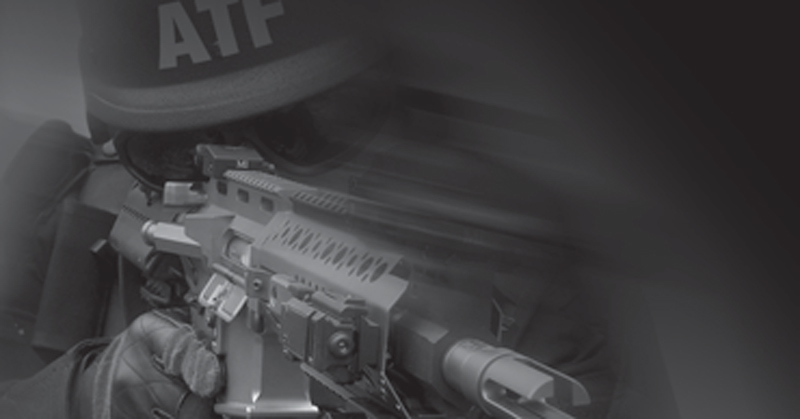We’re told from the time we’re children that government is not only necessary, but good. Without government, our lives would be chaos. We’d be at the mercy of the strongest thugs. Nothing could defend us from them. We could never be sure of holding on to our own possessions. There’d be rampant fraud and mismanagement. Predators would stalk our children. It would just be awful.
Thank heaven that’s not the world we live in. No, we’re okay, because we’ve got government to protect us from things like these:
-

The ATF fits the mold of the out-of-control government agency very , very well. A powerful organization prevents a major trucking company from firing a driver with an admitted alcohol-abuse problem.
- Heavily armed thugs burst into a guitar factory and take away pallets of expensive exotic wood.
- An organization providing day-care services for the children of working parents actually staffs the positions with convicted rapists and child molesters.
- A powerful organization takes money from unwilling donors and provides over half a billion dollars of it to a private corporation that is known to be operating on very shaky grounds. The money disappears. The corporation goes bankrupt. What employees the company did have are unemployed.
- That same organization gives $20 million to another fraudulent group, claiming thousands of environmentally friendly jobs will result. The money disappears and 14 jobs result. Few of the jobs result in any useful work performed.
Yes, thank heaven we’ve got government to prevent such abuses.
But wait. All those things were done by government—most by the federal government, some by states, and some by multi-level government partnerships. And all were in the news in a single week late in 2011.
How can this be? Government always promises to fix the problems of society. When government goes wrong, which it does constantly, somebody always promises to “fix” the problems of government. But somehow those problems never get fixed. Generally they just get worse. Why? Why does this happen year after year, decade after decade?
It would take volumes to answer those questions. One little article won’t do it. But let’s just take one long-time federal agency as an example. This agency is pretty typical of how federal bureaucracies work. It’s notoriously and perpetually mismanaged. It’s responsible for hundreds of deaths and countless persecutions of non-violent Americans. It’s universally loathed. Yet it goes on like a perpetual motion machine, gathering more money and power all the time.
We’ve chosen this agency both because it is typical and because it’s nearest and dearest to the hearts of gunfolk everywhere. We’re talking about the Bureau of Alcohol, Tobacco, Firearms and Explosives (ATF). Here are just a few of the reasons why it—and by extension government in general—doesn’t “work” and never will.
Table of Contents
GOVERNMENT ORGANIZATIONS DON’T REALLY NEED A USEFUL FUNCTION
Their purposes are to keep their agents employed and enhance the authority and prestige of their managers. When Prohibition was repealed in 1933, the agents of the FBI’s Alcohol Beverage Unit had a real problem. They suddenly found themselves back in the Treasury Department, collecting taxes from legitimate companies. It was dull. There wasn’t any real work left for these stalwart agents, who the year before had been chasing Al Capone and busting up speakeasies in front of newsreel cameras.
But they weren’t laid off. They didn’t go get real jobs. The very next year, Congress passed the National Firearms Act. The NFA was basically a tax measure, but written so that it could be made to grant much more power to law enforcement. The useless agents suddenly became very zealous about hunting down and punishing anyone who’d dare break any provision of this otherwise minor tax law, and they’ve been doing it—with increasing brutality—ever since.
GOVERNMENT ORGANIZATIONS GET TO PICK THEIR OWN “CUSTOMERS”
By 1982, the stink arising from ATF’s inability to find enough felons to keep itself busy had risen to the very halls of Congress. Following the Gun Control Act of 1968, the ATF took to entrapping gun collectors into selling a few guns to agents. Then they would bust the collectors for “engaging in the business” of selling guns without a license. Even when they couldn’t make cases, they confiscated entire, and sometimes very expensive, collections.
They forgot that some of those people could afford good lawyers.
In 1982, in front of a Senate subcommittee, the ATF was forced to admit that over 75 percent—75 percent!—of its cases involved “individuals who lack all criminal intent and knowledge.” The Senate report called ATF practices “constitutionally, legally and practically reprehensible.” Eventually Congress passed the 1986 Firearms Owners Protection Act, which may have been well-intentioned, but in the long run only made things worse—and gave the ATF new victims to go after.
WHEN GOVERNMENT AGENTS DO BAD THINGS, ONLY THEIR VICTIMS PAY
ATF’s practices can be slimy and downright brutal. In 1989, an ATF informant claimed Randy Weaver had sold him two illegal sawed-off shotguns. An ATF agent tried to use that to pressure Weaver into snitching on a nearby Aryan Nations group. Weaver refused, and that set off a series of tragedies that ended with several deaths and severe injuries. Although the federal government ultimately had to pay $3.1 million to the surviving Weavers, no government agent was ever disciplined for any of this.
In February 1993, using fraudulent information to get a warrant, agents of the ATF launched a violent raid on the Branch Davidian church and residence outside Waco, Texas. The agents learned the Davidians knew the raid was coming and were armed against it. But instead of changing plans and peacefully nabbing Davidian leader David Koresh on one of his morning jogs, they went ahead with the full-force raid anyway.
Why? Turns out they’d brought news reporters with them, and didn’t want to disappoint. The resulting completely avoidable shoot-out left four dead and 16 wounded agents, and at least six dead and an unknown number of wounded Davidians. No government agent was ever disciplined for any of this.
Extreme negative publicity never seems to stop the ATF, though. The very next year, ATF agents raided the home of Harry Lamplugh, a prominent gunshow promoter. (ATF agents really seem to have a thing about gun shows.) The agents went on a veritable rampage in Lamplugh’s house, destroying furniture, scattering papers and medicines, and killing three pet cats, which almost certainly had not attacked the agents. One of the dead cats was a Manx kitten, stomped to death before the victims’ horrified eyes. Again, no government agent was ever disciplined.
Space does not permit anything remotely like a complete list of ATF outrages against American citizens, their supposed “customers.” But the jackboots march on.
BUDGETS ONLY INCREASE, NEVER DECREASE
ATF is in the news constantly, and rarely in a good way. It is an evergreen embarrassment to the government. Yet somehow its budget keeps growing.
From the Congressional Research Service:
“From FY2001 through FY2010, Congress increased direct appropriations for the ATF from $771.0 million to $1.158 billion. The FY2010 appropriation amount includes $37.5 million in supplemental appropriations for Project Gunrunner. With this supplemental, Congress has provided ATF with $86.5 million in budget increases over three fiscal years, FY2008 through FY2010, to combat gun trafficking. Most of this funding has been allocated to Project Gunrunner, an ATF initiative to reduce gun trafficking across the Southwest border, or other projects to assist the government of Mexico.”
You do remember Operation Fast and Furious, also known as Project Gunwalker? It was the outrageous plan in which the ATF (apparently directed by high Justice Department officials) deliberately allowed approximately 2,000 U.S.-sold guns to gallop into the hands of Mexican drug cartels, resulting in (so far) 200 or so deaths.
I’m sure the government of Mexico appreciates the assistance; they were having so much trouble arming their drug cartels themselves. We do wonder, though, what did ATF find to spend $86.5 million on? Did they buy the guns themselves, at Pentagon prices, or what?
I (Claire) wrote about Project Gunwalker, ATF’s scandal du jour, in the October 2011 issue of S.W.A.T. There isn’t enough space to go into it here, except to make one final point:
GOVERNMENT AGENCIES’ POWER ALWAYS INCREASES, NEVER DECREASES
The ATF got its start enforcing Prohibition laws. Then it moved to alcohol and firearms tax laws. Then laws governing alcohol production and firearms sales. Then laws and regulations on alcohol, tobacco and firearms. Then alcohol, tobacco, firearms and explosives. Lately they’re getting involved in border security and narcotics. Badly, we hardly need to add.
Oh, yes. And the ATF officials in charge of the murder-enabling Gunwalker? Most of them have been promoted. One was even placed high up in a department that oversees—wait for it—ethics. Not one has been fired, let alone charged with a crime. (What do you think the government would do to you if you were responsible for such monstrous savagery?)
All this new power continues to come in the face of one scandal after another and decades of complaints from its citizen “customers.” Even when dragged before congressional committees to answer for its misdeeds, which has happened at least three times in its modern history, the ATF’s power, influence and budget only increase.
The ATF fits the mold of the out-ofcontrol government agency very, very well. But we could have chosen nearly any other government agency and made discouragingly similar points. Maybe someday we’ll write a column about Housing and Urban Development and really curl your hair.
It’s not just one “rogue” agency. It’s not just a handful of bad apples. This is simply how things work when you’re a government. You get to make the rules, and it quickly ceases to matter whether you’re really doing any good. If you’re doing it, it’s good by definition—for you.
And that’s why big government doesn’t work—and never will.


